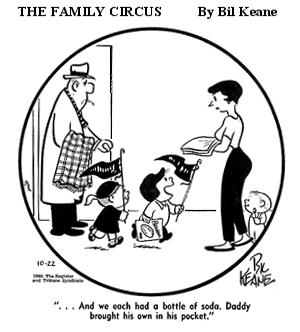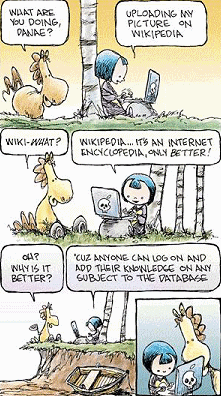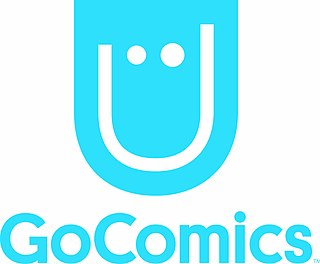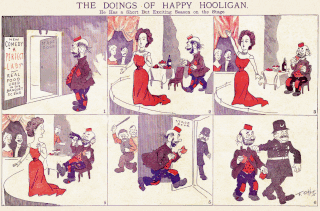External links
| | This comic strip–related article is a stub. You can help Wikipedia by expanding it. |
| Retail | |
|---|---|
| Author(s) | Norm Feuti |
| Website | Gil |
| Current status/schedule | Sunday Only |
| Launch date | January 2, 2012 [1] |
| Syndicate(s) | King Features Syndicate [2] |
Gil is a syndicated comic strip written and illustrated by the American cartoonist Norm Feuti. It is distributed by King Features Syndicate. [2] [1] [3]
On 2 December 2013, Feuti announced that Gil would cease publication at the end of the year. [4] However, on May 11, 2014, Feuti announced that Gil would return as a Sunday-only comic in the Providence Journal . [5] On January 1, 2023, Feuti announced that the Providence Journal decided to stop carrying the feature at the end of 2022. [6]
Gil the title character, is a chubby elementary school student who is usually picked last in school for sports. [3] He lives with his divorced factory working mother Cheryl. [3] [7] [8] Gil prefers instead to live in a nuclear family, thinking it would give him superpowers. [7] He is shown visiting his father Frank every week. [8] [9]
Gil A chubby and cheerful eight-year-old boy, who loves comic books, video games and superheroes. He is an only child who lives with his mother and visits his father on alternate weekends. [8]
Shandra Gil's best friend, neighbor, and classmate. Shandra's parents also are divorced. She has signature puffy pigtails and a very sensible attitude. She is a loyal friend and a very supportive confidante. [8]
Cheryl Gil's mom is a very hardworking single mother who works full-time in a factory. [8]
Frank Gil's dad is shown to be a lazy underachiever. [8]
Morgan is Gil's mean-spirited classmate and antagonist. [8]
Troy Cheryl's boyfriend
Voltron Gil and Cheryl's cat
Mr. Klopec Gil's neighbor, who usually is seen on the porch of the apartment building
A comic strip is a sequence of cartoons, arranged in interrelated panels to display brief humor or form a narrative, often serialized, with text in balloons and captions. Traditionally, throughout the 20th and into the 21st century, these have been published in newspapers and magazines, with daily horizontal strips printed in black-and-white in newspapers, while Sunday papers offered longer sequences in special color comics sections. With the advent of the internet, online comic strips began to appear as webcomics.
Dan Perkins, better known by his pen name Tom Tomorrow, is an American editorial cartoonist. His weekly comic strip, This Modern World, which comments on current events, appears regularly in more than 80 newspapers across the United States and Canada as of 2015, as well as in The Nation, The Nib, Truthout, and the Daily Kos, where he was the former comics curator and now is a regular contributor. His work has appeared in The New York Times, The New Yorker, Spin, Mother Jones, Esquire, The Economist, Salon, The American Prospect, CREDO Action, and AlterNet.

The Family Circus is a syndicated comic strip created by cartoonist Bil Keane and, since Keane's death in 2011, is written, inked and rendered (colored) by his son Jeff Keane. The strip generally uses a single captioned panel with a round border, hence the original name of the series, which was changed following objections from the magazine Family Circle. The series debuted on February 29, 1960 and has been in continuous production ever since. According to publisher King Features Syndicate, it is the most widely syndicated cartoon panel in the world, appearing in 1,500 newspapers. Compilations of Family Circus comic strips have sold more than 13 million copies worldwide.

King Features Syndicate, Inc. is an American content distribution and animation studio, consumer product licensing and print syndication company owned by Hearst Communications that distributes about 150 comic strips, newspaper columns, editorial cartoons, puzzles, and games to nearly 5,000 newspapers worldwide. King Features Syndicate also produces intellectual properties, develops new content and franchises, like The Cuphead Show!, which it produced with Netflix, and licenses its classic characters and properties.

Non Sequitur is a comic strip created by Wiley Miller starting February 16, 1992 and syndicated by Andrews McMeel Syndication to over 700 newspapers. It is also published on gocomics.com and distributed via email.

Henry is a comic strip created in 1932 by Carl Thomas Anderson. The title character is a young bald boy who is mute. Except a few early episodes, the comic strip character communicates largely but not entirely through pantomime, a situation which changed when Henry moved into comic books. Henry has spoken in at least one Betty Boop cartoon from 1935. In the feature, Betty Boop has a pet shop and Henry speaks to a dog in the window.

Dana Claire Simpson, born David Simpson, is an American cartoonist, best known as the creator of the comic Phoebe and her Unicorn, as well as the long-running webcomic Ozy and Millie. Other works created by Simpson include the political commentary cartoon I Drew This and the alternate reality drama comic Raine Dog.

Frances Edwina Dumm was a writer-artist who drew the comic strip Cap Stubbs and Tippie for nearly five decades; she is also notable as America's first full-time female editorial cartoonist. She used her middle name for the signature on her comic strip, signed simply Edwina.

GoComics is a website launched in 2005 by the digital entertainment provider Uclick. It was originally created as a distribution portal for comic strips on mobile phones, but in 2006, the site was redesigned and expanded to include online strips and cartoons. GoComics publishes editorial cartoons, mobile content, and daily comics. It is currently owned by Andrews McMeel Universal.
Katherine Shannon Collins is a Canadian-born cartoonist, writer, media personality, stage performer, and composer. She created the newspaper comic strip Neil the Horse from 1975 to 1991.

Happy Hooligan is an American comic strip, the first major strip by the already celebrated cartoonist Frederick Burr Opper. It debuted with a Sunday strip on March 11, 1900 in the William Randolph Hearst newspapers, and was one of the first popular comics with King Features Syndicate. The strip ran for three decades, ending on August 14, 1932.
Nicole Hollander is an American cartoonist and writer. Her daily comic strip Sylvia was syndicated to newspapers nationally by Tribune Media Services.
Steve Kelley of the Pittsburgh Post-Gazette is a syndicated editorial cartoonist, comic strip creator, comedian, and writer. He has previously served as staff political cartoonist for The San Diego Union / The San Diego Union-Tribune and The New Orleans Times-Picayune. He began work at the Post-Gazette in November 2018.

Norm Feuti is an American cartoonist best known for his nationally syndicated comic strips Retail and Gil.
Cul de Sac is an American comic strip created by Richard Thompson. It was distributed by Universal Press Syndicate/Universal Uclick to 150 worldwide newspapers from 2004 to 2012.

The McNaught Syndicate was an American newspaper syndicate founded in 1922. It was established by Virgil Venice McNitt and Charles V. McAdam. Its best known contents were the columns by Will Rogers and O. O. McIntyre, the Dear Abby letters section and comic strips, including Joe Palooka and Heathcliff. It folded in September 1989.

T.H.E. Fox is a furry comic strip by Joe Ekaitis which ran from 1986 to 1998. It is among the earliest online comics, predating Where the Buffalo Roam by over five years. T.H.E. Fox was published on CompuServe, Q-Link and GEnie, and later on the Web as Thaddeus. Despite running weekly for several years, the comic never achieved Ekaitis' goal of print syndication. Updates became less frequent, and eventually stopped altogether.

Tina's Groove is a comic strip by Rina Piccolo with a restaurant setting. Distributed by King Features Syndicate, it began in 2002. The comic strip ended its run on July 2, 2017.
Canadian comics refers to comics and cartooning by citizens of Canada or permanent residents of Canada regardless of residence. Canada has two official languages, and distinct comics cultures have developed in English and French Canada. The English tends to follow American trends, and the French, Franco-Belgian ones, with little crossover between the two cultures. Canadian comics run the gamut of comics forms, including editorial cartooning, comic strips, comic books, graphic novels, and webcomics, and are published in newspapers, magazines, books, and online. They have received attention in international comics communities and have received support from the federal and provincial governments, including grants from the Canada Council for the Arts. There are comics publishers throughout the country, as well as large small press, self-publishing, and minicomics communities.